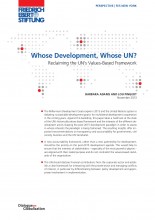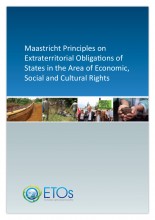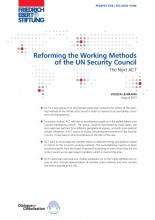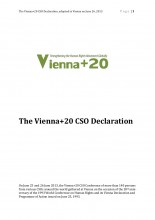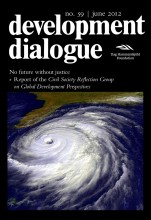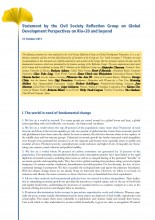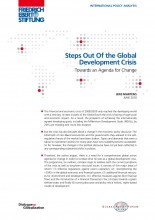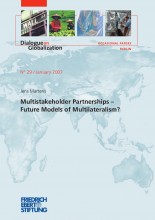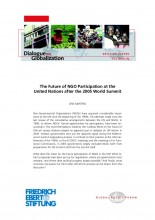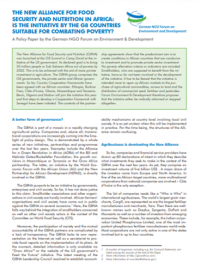
United Nations & Multilateralism - Archive

A new policy paper published by the German NGO Forum on Environment and Development argues that the G8 New Alliance for Food Security and Nutrition in Africa will not be able to combat hunger and food insecurity in Africa. On the contrary, the paper, to which Global Policy Forum contributed, points out that the New Alliance is mainly focused on providing multinationals with opportunities to reap profits through the creation of environments conducive to investment. Thus, the paper calls for [...]
The world faces an unprecedented coincidence of global crises. They testify to the failure of the dominant model of development and economic progress that is oriented on a technocratic modernisation path, is blind to human rights and the ecological limits of the global ecosystem, confuses growth of Gross Domestic Product with progress in society, and regards poverty as a primarily technical challenge in which categories of inequality and social justice are neglected.
The Civil Society Reflection Group on Global Development [...]
On 31 October 2011 the Reflection Group submitted a statement to the secretariat of the Rio+20 Conference to be held in June 2012. It was prepared during a drafting session in October in New Paltz, NY and highlights some of the issues and proposals that will come up in the final report of the Reflection Group again. The final report will come out in spring of 2012 after a final meeting of the Group.
The financial and economic crisis of 2008/2009 only reached the developing world with a time lag. At least in parts of the Global South the crisis is having a huge social and economic impact. As a result, the prospects of achieving the internationallyagreed developing goals, including the Millennium Development Goals (MDGs), by2015 are receding ever more into distance.But the crisis has also brought about a change in the economic policy discourse. The blind faith of neo-liberal economists and the overnments [...]
Having seen dynamic developments in the 1990s, relations between the United Nations (UN) and civil society are now at a critical stage. The number of private actors participating in international negotiations has been increasing and led to a more extensive involvement of these actors in global policy processes. But all attempts to extend formal participatory rights for Non-Governmental Organizations (NGOs) in the UN have failed so far.
Some governments have responded rather defensively to the increasing (quantitative) presence of non-state [...]
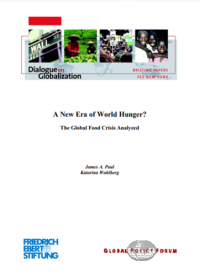
This paper discusses the main causes of the steep run-up in global food prices and the resulting spread of hunger to nearly a billion people worldwide. Authors James A. Paul and Katarina Wahlberg conclude that biofuels and the agro-industrial approach to food production are the main culprits of the food crisis. The paper looks at a wide range of factors endangering nutrition for all, including population growth, unsustainable consumption, international trade policy and climate change. The authors argue for effective [...]
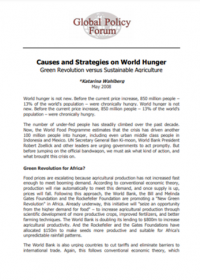
Global Policy Forum's Katarina Wahlberg criticizes the World Bank's proposal to create a Green Revolution in Africa. By focusing on boosting agricultural production through scientific development of more productive crops, the Bank disregards the fact that the Earth's biological systems cannot be exploited forever. The supporters of the new Green Revolution also fail to address the major causes of the global food crisis, including biofuel production and unsustainable global consumption of meat. The author calls for a shift from industrial [...]
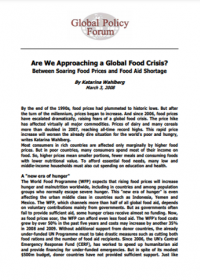
Global Policy Forum's Katarina Wahlberg warns that for the "first time in decades, worldwide scarcity of food is becoming a problem." Increasing demand of cereals for food consumption, cattle feeding and in particular biofuel production, is driving food prices to record levels. Especially the poor, who spend a majority of their income on food, will suffer. To make matters worse, the food price hike is also affecting the amount of food aid available, as governments have not increased funding for [...]
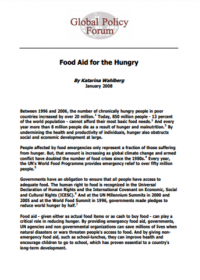
This Global Policy Forum report critically reviews the global food aid system. Author Katarina Wahlberg argues that food aid donors fall short in prioritizing the needs of the poor and hungry. Instead, donor countries use food aid to promote their own national strategic and commercial interests. Such food aid not only fails to reduce hunger, it can also harm long-term food security in recipient countries.
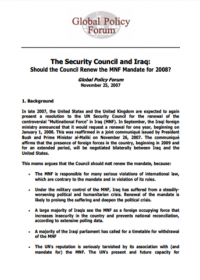
The UN mandate authorizing the Multinational Force in Iraq is up for renewal in late 2007. In this memorandum, Global Policy Forum argues that the Security Council should not renew the mandate. The memo recalls the many ways that the MNF violates international law and human rights. It points out that the political and humanitarian situation in Iraq is worsening and the great majority of Iraqis see the MNF as an occupying force that prevents national reconciliation. The Iraqi parliament [...]

In late 2007, the UN Security Council will consider renewal of the mandate that authorizes the presence of the US-led multinational force (MNF) in Iraq. Global Policy Forum outlines the little-known demands of the Iraqi parliament to ratify any new agreement on the MNF. The Iraqi constitution requires the cabinet to submit such agreement for ratification and the parliament has already passed a law demanding conformity with this provision. A majority of parliamentarians also wrote a letter to Security Council [...]
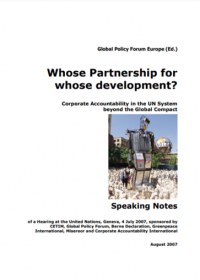
One day before UN Secretary General Ban Ki-Moon chaired the second "Global Compact Leaders Summit" in Geneva, a group of NGOs sponsored a hearing to assess the UN corporate initiative. Speakers addressed the failure of the Global Compact to hold its signatories accountable for basic human rights, as well as environmental and labor standards. The speakers also discussed how many translational corporations exploit their Global Compact memberships to advance their public relations, and oppose initiatives calling for binding international regulation [...]
Non-Governmental Organisations (NGOs) have acquired considerable importance at the UN since the beginning of the 1990s. Yet attempts made since the last review of the consultative arrangements between the UN and NGOs, in 1996, to reform NGOs’ formal opportunities for participation, have been unsuccessful. The recommendations made by the Cardoso-Panel on the future of UN-civil society relations played no apparent part in debates on UN reform in 2005. Instead, governments sent out the opposite signal during the Millennium+ 5 Summit [...]

